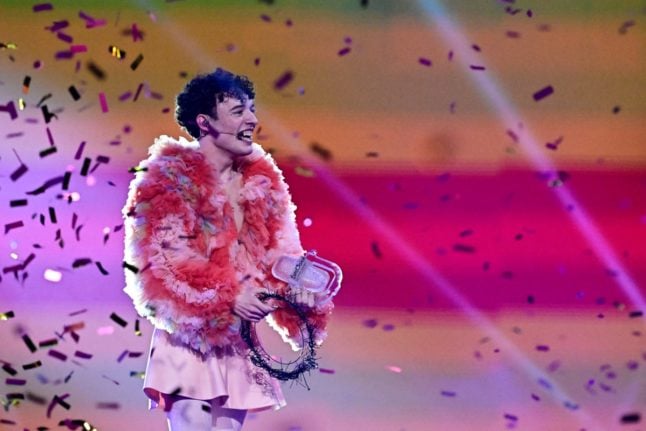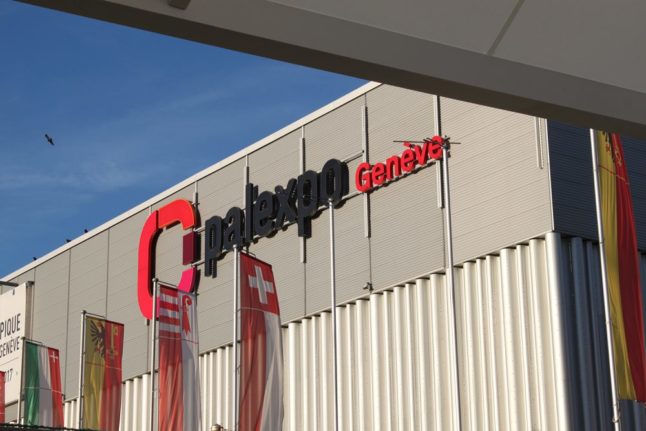Twenty-four-year-old Nemo’s “The Code” won the highest score from nations’ juries, and enough of the popular votes to get 591 points, edging out Croatia in the final, held in Sweden’s Malmo.
“I hope this contest can live up to its promise and continue to stand for peace and dignity for every person in this world,” a teary-eyed Nemo said while receiving the trophy.
Nemo’s journey towards realising their non-binary gender identity served as inspiration for the highly personal winning entry.
“‘The Code’ is about the journey I started with the realisation that I am neither a man nor a woman,” Nemo said.
In Zagreb, a crowd gathered at a square to follow Croatia’s Baby Lasagna, who finished second with 547 points.
“There is no room for sadness, only pride,” 34-year-old spectator Nina Plese told AFP.
“This young man has brought the whole of Croatia together. We can be proud of him and he deserves to be welcomed back home.”
Nemo, Baby Lasagna and Israel’s contestant Eden Golan, had been bookmaker favourites to win the competition, watched around the world by millions of lovers of pop music — and kitschy shows.
Twenty-five nations competed Saturday but much of the focus has centred on the controversy of Israel being able to take part.
When Golan went on stage to perform her “Hurricane”, both cheers and boos could be heard from the audience in the Malmo Arena.
Boos could also be heard while Israel delivered its points to other acts and any time a country gave “Hurricane” high scores.
Golan finished fifth with 375 points.
Eurovision ‘needs fixing’
Organisers had banned all flags other than those of the participating countries, but Nemo had smuggled in a flag representing non-binary people which they displayed during the show’s introduction.
“I had to smuggle my flag in,” Nemo told a press conference after the win, adding that “maybe Eurovision needs a little bit of fixing.”
The young performer also said that the experience had been “really intense and not just pleasant all the way.”
“There were a lot of things that didn’t seem like it was all about love and unity and that made me really sad,” Nemo told reporters.
Outside the arena, police pushed back protesters where more than a hundred demonstrators waved flags and chanted “Free Palestine”.
Diverse Malmo is home to the country’s largest community of Palestinian origin and according to police at least 5,000 people gathered to protest in the city in the afternoon.
The European Broadcasting Union, which oversees the event, confirmed in March that Golan would take part, despite calls for her exclusion from thousands of musicians around the world.
The same month, contestants from nine countries, including Nemo, called for a lasting ceasefire.
Watching from afar
In Tel Aviv, Eurovision fans gathered to watch the show on big screens, and at the packed Layla bar in Tel Aviv, they told AFP they hoped voters would show Israel some love.
An Israeli victory would have meant that “maybe we are not hated so much, and that the music really won”, said Tal Bendersky, draped in an Israeli flag, before the results were announced.
The 23-year-old from southern Israel told AFP he had come to Layla, which prides itself as being the best gay bar in Tel Aviv, “to celebrate with all the people that love the Israeli people”.
The Gaza war started with Hamas’s unprecedented October 7 attack on Israel that resulted in the deaths of more than 1,170 people, mostly civilians, according to an AFP tally of Israeli official figures.
Israel’s retaliatory offensive has killed at least 34,971 people in Gaza, mostly women and children, according to the Hamas-run territory’s health ministry.
Although police have said no direct threats have been made at the competition, they boosted their numbers with reinforcements from Norway and Denmark.
To gain access to the Malmo Arena, the around 9,000 spectators had to pass through a reinforced security system designed in particular to discourage protesters.
The contest itself was also rattled earlier Saturday by the disqualification of Dutch contestant Joost Klein due to an incident with a camerawoman.
Dutch broadcaster AVROTROS said the incident had involved Klein making a “threatening movement” after he was filmed directly after coming off stage “against clearly made agreements”.



 Please whitelist us to continue reading.
Please whitelist us to continue reading.
Member comments